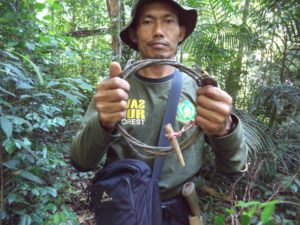
An active tiger snare confiscated by the TPCU © FFI/KSNP

Arrested encroacher flanked by TPCU and Police officers © FFI/KSNP
In this interim report from FFI, six Tiger Protection and Conservation Units (TPCUs) were active and conducted a total of 60 SMART foot patrols across the Kerinci Seblat National Park and park-edge forests. The TPCUs walked a distance of 554 miles (891km) using GPS Waypoint.
The patrols made a total of 45 individual Sumatran tiger records with Frequency of Encounter stable at one tiger per 12.3 miles (19.8km) in patrols across the national park and park-edge forests of three provinces.
More than 70 investigations were logged and one intelligence-led tiger law enforcement was conducted which resulted in the arrest and prosecution of two hunters and a local IWT broker. In addition a farmer was also arrested after persistent encroachment deep in the Park, clearing land for coffee production.
However, a worrying increase in the use of guns by poachers is reported by FFI which may be due to teeth and bone being the most ‘in-demand’ body parts so that bullet wound injuries to the skin are less of an issue than in the past and illegally modified weapons are easier to obtain. It may also be a response, in some areas, by poachers to loss of their snares (and so a substantial investment in time and money) to law enforcement patrols. This has also been corroborated by other NGOs working in other parts of Sumatra.
In response to a disappointingly short sentence given to a poacher in 2018, 20 prosecutors from districts of Bengkulu attended a training workshop delivered by national legal experts from the ministry of law in Jakarta and by Bengkulu provincial police. Those present were briefed on benchmark sentencing and on links between poaching and trade in tigers and Organised Crime to ensure that sentences match the crime.
Read more about the Kerinci Seblat Tiger Protection and Conservation project here
Download the full report here
Find out about Kerinci Seblat National Park and the problems it faces from encroachment and road building here in a Mongabay article

